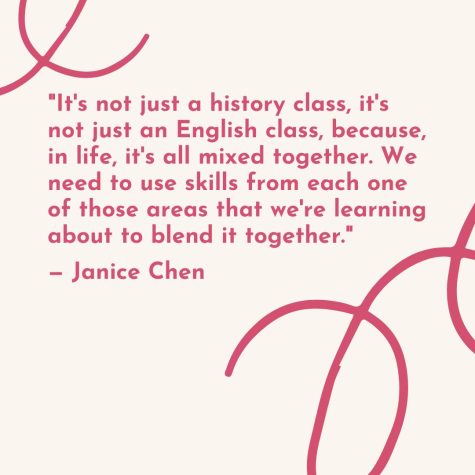Woman in administration: Janice Chen
Exploring the experiences of a woman in administration and education
Seperate subjects don’t do students justice anymore. A collaborative environment is necessary
April 17, 2023
Sitting in her living room as a child, assistant principal Janice Chen played “teacher-student” with her younger brother where she pretended to be a teacher and taught him various academic subjects using a whiteboard. From a very young age, Chen had a deep interest in the field of education.
“I would think, ‘Is this the grade I want to be a teacher for?’” Chen said. “And so, I knew from a very young age [that] teaching was something that I was interested in, and [it] was definitely on my mind.”
After Chen graduated from college, she taught in Hawaii, working at a media academy to teach video production, multimedia and digital media. Although the salary was low and she had to waitress after teaching three days a week, she wanted to enjoy her youth and live life to the fullest. She explains that she was interested in developing a curriculum, trying out different teaching methods and seeing what the students enjoy.

“We were able to integrate English [and] History into creating video projects and stuff, so it was a lot of fun being able to see the students, number one, [being] passionate about that and number two, being able to see the connections,” Chen said. “It’s not just a history class [and] it’s not just an English class, because, in life, it’s all mixed together. We need to use skills from each one of those areas that we’re learning about to blend it together.”
Chen explains that although she loves being a part of the education system, it’s not perfect. According to her, the education system would benefit from a shift towards more project-based instruction, as it not only helps students experience the traditional content taught in every classroom but also fosters the development of valuable soft skills. Chen emphasizes that project-based learning helps students communicate with each other, work through conflict, make compromises and much more.
“We’re not going to remember dates, times and formulas 100 years from now,” Chen said. “It’s not necessary. Now, we have other resources to be able to get that information. So what are the important skills that our students need to have learned before graduating, before leaving here, so that they can be successful in college and beyond? It’s a lot of the soft skills that I think that are naturally embedded.”
For Chen, her favorite part about being an educator is watching her students graduate. She explains that graduation represents the culmination of four years of tireless effort for the graduating class and the challenges they went through to get to where they are now.
“It takes a village because it’s not just the student graduates walking across the stage,” Chen said. “[It’s] the support of their family, with the support of the teachers, with the support of coaches [and] administration — it’s really that community.”
Chen explains that there are predominantly female educators in the field of education. According to her, many women choose to pursue a career in education because it is a respected profession, and having children in the future is easier due to the breaks and the ability to take maternity leave. However, she says she is hopeful that women will pursue education for their own passions and aspirations to make a positive impact.
Chen expresses that she will continue working in the education sector for at least another 20 years, and one of her goals is to eventually become a principal. Despite Chen’s goals, she acknowledges her contentment with the position she currently holds.
“I also believe that it’s important to be present, and I think at this point in time of my life I’m really happy with where I’m at,” Chen said. “I may pursue those dreams, but they’re kind of just floating there.”




























